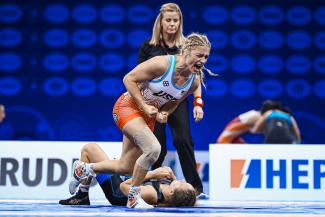Three nations aim to get first Greco U23 world champs
Monday, October 21, 2024 - 22:48 By Vinay Siwach

TIRANA, Albania (October 21) -- Kyrgyzstan, the United States and Uzbekistan will stand a chance to crown their first-ever U23 world champion in Greco-Roman.
It was after the countries had one finalist each on day one of the U23 World Championships that kicked off in Tirana, Albania on Monday.
The United States and Uzbekistan have already had a historical day, confirming their first-ever U23 World Championships medals in Greco-Roman. Beka MELELASHVILI (USA) reached the 82kg final while Alisher GANIEV (UZB) made it to the 55kg final. Both countries had fifth as their best finishes before Monday in the history of the U23 Worlds, which came into existence only in 2017.
Kyrgyzstan will be banking on Razzak BEISHEKEEV (KGZ) to win the first Greco-Roman gold medal at U23 Worlds after he reached the 67kg final. Zholoman SHARSHENBEKOV (KGZ) is the only other Greco wrestler to reach the final in 2019 but lost.
Georgia and Armenia were the only countries with two finalists on day one of the tournament. Surprisingly, Iran managed only one finalists out of the five weight classes that were in action.

Diego CHKHIKVADZE (GEO) and Giorgi CHKHIKVADZE (GEO) were the two finalists for Georgia at 67kg and 72kg respectively. Both had finished with silver medals at the U20 World Championships in 2021 but will look to win the gold together on Tuesday.
Chkhikvadze defeated Daniial AGAEV (AIN), 4-4, in the semifinal with a correct throw in the last minute to take two points and a criteria lead. He will now take on Beishekeev who defeated Arslanbek SALIMOV (POL) 10-0 to win the other semifinal.
Giorgi was in much more control of his 7-0 win over Adilkhan NURLANBEKOV (KGZ) in the semifinal and will now take on Shant KHACHATRYAN (ARM). The two had met in the semifinals of the U20 World Championships in 2021 and Giorgi won that meeting.
Khachatryan took no time to see off Georgios BARBANOS (SWE) 9-0 in the semifinal, his fourth technical superiority in the tournament, including a fall over Danial SOHRABI (IRI).
The second Armenian to reach the final was Hayk KHLOYAN (ARM) at 97kg after he held off senior European silver medalist Magomed MURTAZALIEV (AIN) 3-3 in the semifinal. Both exchanged par terre and one turn in gut-wrench but Khloyan performed it in the second period, keeping the criteria to him.
He will face Paris Olympian Abubakar KHASLAKHANAU (AIN) in the final. Khaslakhanau won his semifinal Richard KARELSON (EST), 2-1.
 Beka MELELASHVILI (USA) confirmed the U.S. first ever Greco medal at U23 World Championships. (Photo: United World Wrestling / Amirreza Aliasgari)
Beka MELELASHVILI (USA) confirmed the U.S. first ever Greco medal at U23 World Championships. (Photo: United World Wrestling / Amirreza Aliasgari)
The U.S. has already achieved its best result ever in U23 Worlds in Greco but Melelashvili would look to make it golden on Tuesday. He will face Mohammad NAGHOUSI (IRI) in the final.
Melelashvili wrestled Elmin ALIYEV (AZE) in the semifinal and fell behind 3-0 at the break. But he returned the favor to Aliyev in the second period. Initially not scored, Melelashvili got the two points for a gut wrench after a challenge. Naghousi defeated former U20 world champion Deni NIKAEV (GER), 6-1, in the semifinal.
Ganiev has already won Uzbekistan's first-ever U23 World Championships medal but will look to win one more bout and get his name in history books in golden. He humbled Nihad GULUZADE (AZE) 9-0 in the semifinals and will now face Dinislam BAMMAPTOV (AIN).
RESULTS
60kg
GOLD: Alisher GANIEV (UZB) vs. Dinislam BAMMATOV (AIN)
SF 1: Alisher GANIEV (UZB) df. Nihad GULUZADE (AZE), 9-0
SF 2: Dinislam BAMMATOV (AIN) df. Pridon ABULADZE (GEO), 4-1
67kg
GOLD: Razzak BEISHEKEEV (KGZ) vs. Diego CHKHIKVADZE (GEO)
SF 1: Razzak BEISHEKEEV (KGZ) df. Arslanbek SALIMOV (POL), 10-0
SF 2: Diego CHKHIKVADZE (GEO) df. Daniial AGAEV (AIN), 4-4
72kg
GOLD: Shant KHACHATRYAN (ARM) vs. Giorgi CHKHIKVADZE (GEO)
SF 1: Shant KHACHATRYAN (ARM) df. Georgios BARBANOS (SWE), 9-0
SF 2: Giorgi CHKHIKVADZE (GEO) df. Adilkhan NURLANBEKOV (KGZ), 7-0
82kg
GOLD: Mohammad NAGHOUSI (IRI) vs. Beka MELELASHVILI (USA)
SF 1: Mohammad NAGHOUSI (IRI) df. Deni NAKAEV (GER), 6-1
SF 2: Beka MELELASHVILI (USA) df. Elmin ALIYEV (AZE), 3-3
97kg
GOLD: Hayk KHLOYAN (ARM) vs. Abubakar KHASLAKHANAU (AIN)
SF 1: Hayk KHLOYAN (ARM) df. Magomed MURTAZALIEV (AIN), 3-3
SF 2: Abubakar KHASLAKHANAU (AIN) df. Richard KARELSON (EST), 2-1


Share your thoughts.
Comments